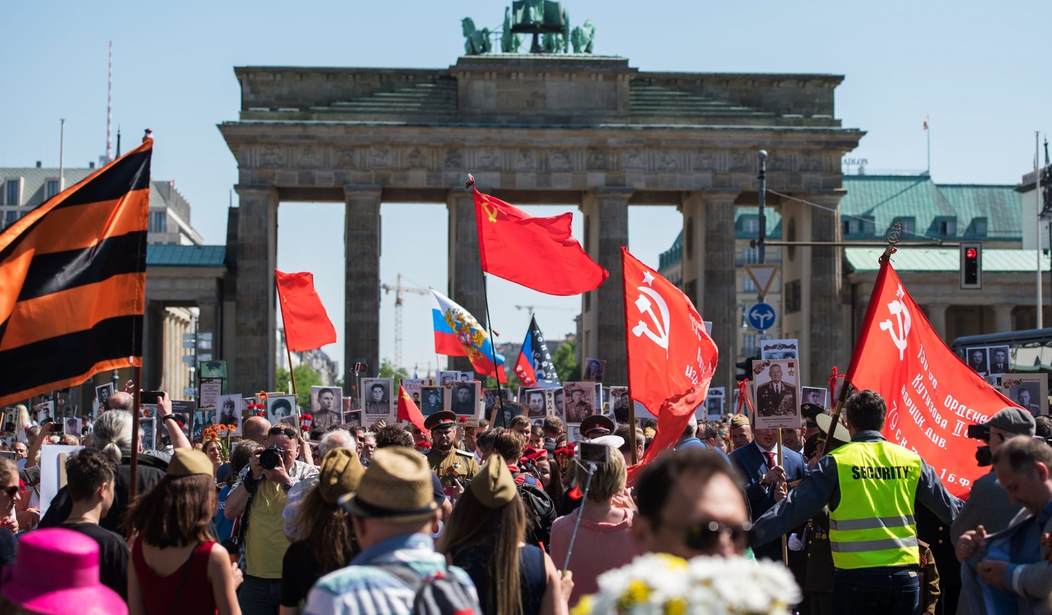Since the time of Augustus, when a German army under Arminius wiped out three Roman legions in the Teutoburg Forest and sent the Empire scurrying back permanently across the Rhine, the question of how to live with the Germans has concerned both their immediate neighbors in central Europe and, latterly, the world. From the ferocious Vandals who sacked Rome in 455 to the hapless Hessians who got surprised by George Washington at the Battle of Trenton to the Panzer divisions of the Wehrmacht that swept across Europe and the Soviet Union in 1939-41, the Germans, it seems, are always a problem.
After the war, tamed and domesticated, and despite (or perhaps because of?) being bisected into capitalist and communist states, the Germans developed a cohesive civil society that abjured aggressive warfare and, shielded by the American nuclear umbrella and some 50,000 U.S. troops, turned into a pacifist state, especially after the fall of the Wall in 1989 and reunification. So… yay, right?
Not so fast. Today, under the worst German chancellor since you-know-who, the Germans are once again part of the problem instead of the solution. Having had the starch beaten out of them by the Russians, the British, and the Americans during the war, and still bearing the enormous burden of their war crimes during the National Socialist period, the Germans have turned passive-aggressive, bullying the European Union while at the same time destabilizing the Continent with Angela Merkel’s disastrous and inexplicable decision to throw open her country’s — and thus Europe’s — borders to more than a million mostly Muslim “refugees” and “asylum seekers,” a move that will have deadly consequences in the future as a childless Europe moves toward senescence.
The state of affairs inside Germany is symbolized by this story in the Los Angeles Times:
There are so few German army helicopters available for the troops that pilots have been forced to train in bright yellow civilian choppers leased from the German Automobile Club.
A chronic shortage of spare parts and assorted technical woes have grounded 29 of the Bundeswehr’s 130 camouflage-green helicopters. Acute shortages of parts have also left only 39 of the Luftwaffe’s 128 Eurofighter jets combat-ready — idled along with nearly half of the armed forces’ 224 Leopard tanks and five of its six submarines.
No country in the North Atlantic Treaty Organization alliance has savored the “peace dividend” as much as Germany, which slashed military spending in half after the Cold War. And no country in NATO has drawn more criticism from President Trump for not carrying its own military weight than Germany.
The country’s embarrassingly long laundry list of inoperable fighter jets, grounded helicopters, idled tanks and dry-docked submarines has exacerbated tension between Germany and the United States, which — like other NATO allies — worries about the threat of Russian aggression after its annexation of Crimea in 2014.
But for many Germans, a country with a deeply pacifist streak following two wars in the last century, the lack of military preparedness is of little concern. In fact, it’s a source of pride among the peaceniks who grew up with a post-World War II idealism of a world without wars — the Nie wieder Krieg generation.
“Nie wieder Krieg” (never again war) is all well and good if you’re talking about starting World War III, just as Germany started the first two world wars. But it says absolutely nothing about fighting a defensive war, a war for national and cultural survival. Such moral preening, however, is characteristic of today’s Germany; the necessity to assert national superiority even when on the losing side of an argument is quite typical. The Germans may be defenseless in the event of a shooting war (at the moment, more likely from within than without), but at least they will be pleased with themselves as they submit to the knives, bullets and bombs of the Mohammendans.
“We don’t need weapons,” said Anja Kruger, a 51-year-old Berlin travel agent. “Instead of spending money on arms, it should be spent on education and making people’s lives better. Maybe it sounds naive, but the world needs more empathy and not war — never, ever.”
It has been more than 70 years since World War II ended, and many Germans have little or no memory of wartime. “They’re more interested in their own welfare and their prosperity, and don’t feel threatened,” said Gero Neugebauer, a political scientist at Berlin’s Free University. “After generations of living in peace, the idea of war is too abstract, it’s too far away from their lives.”
The German solution to almost every problem is to deny it exists, until it’s too late. Thus German drivers on the Autobahnen will plunge headlong into a fog bank at full speed, confident that because there should not be a problem up ahead, there will not be a problem up ahead. This is why 80-car pileups are not uncommon, and defensive driving all but unknown.
My friend and colleague Victor Davis Hanson has some observations on the Germans in this essay for the Hoover Institution:
Every 20 to 50 years in Germany, things start unraveling. Germans feel aggrieved. Ideas and movements gyrate wildly between far left and far right extremes. And the Germans finally find consensus in a sense of victimhood paradoxically expressed as national chauvinism. Germany’s neighbors in 1870, 1914, 1939—and increasingly in the present—usually bear the brunt of this national meltdown.
Germany is supposed to be the economic powerhouse of Europe, its financial leader, and its trusted and responsible political center. Often it plays those roles superbly. But recently, it’s been cracking up—in a way that is hauntingly familiar to its European neighbors. On mass immigration, it is beginning to terrify the nearby nations of Eastern Europe. On Brexit, it bullies the British. On finance, it alienates the southern Europeans. On Russia, it irks the Baltic States and makes the Scandinavians uneasy by doing business with the Russian energy interests. And on all matters American, it increasingly seems incensed.
A bipolar Germany cannot just take in a limited and manageable number of genuine refugees, hope to assimilate them—and then keep quiet about its resulting sense of noblesse oblige. Instead, in a little over a year, Berlin enthusiastically opened its borders and accepted over a million migrants who were mostly unvetted and from the Middle East and North Africa, defending this radical policy with virtue sloganeering about German magnanimity (“we can do this”). Until recently, a mostly homogenous Germany had little experience with diversity, much less with assimilating and integrating mostly impoverished, male, Muslim immigrants. The result of these massive influxes from the Middle East has often been chaos. In an Orwellian sort of good-deed imperialism, Germany hectors its worried, smaller, and far more vulnerable European neighbors to embrace the nearly suicidal German model of open European borders.
Fortunately for both the Germans and the Americans, the superb new American ambassador in Berlin, Richard Grenell, has taken up his new position with a dose of straight talk for a Reichstag crew unused to hearing it. In the wake of President Trump’s junking of the Iran nuclear “deal,” he’s told them to choose between doing business with the United States or with the Islamic Republic. Following the president’s lead, Grenell has also demanded that Germany start to raise its defense spending to two percent of its gross domestic product, something the lotus-eating burghers of Hamburg and Munich have been loath to do.
This was, of course, met with incredulity and a good deal of sneering, not only by the Germans but by the anti-American American Left, which immediately mocked Grenell for alienating his new hosts, as if it were the ambassador’s job to make the Germans feel good about themselves. But, as many on the Right immediately pointed out, the job of our diplomatic corps is to represent America to the world, not the world to us. Germany’s slow-motion breakdown of will and national purpose — something that’s been going on since at least the 1980s — is a problem for all of us, and wishing it away, German-style, won’t do. As VDH notes:
Amid the crises in the Middle East, Iran, North Korea, Russia, and China, most Westerners assumed that Germany, given its size and dynamic economy, would continue to be a model Western leader and a calming force in a historically unstable Europe. Instead, it seems to be entering a dangerous phase when at the zenith of its wealth and power, it nevertheless pouts and blames…
In a perfect world, Germany would address its frustrations through introspection. After all, no one forced Berlin to take in over a million problematic refugees from the Middle East. No one forced it to export goods on easy credit to leveraged buyers who visibly lived far above their means. No one forced it to renege on its NATO defense promises and responsibilities. No one forced it to have a long and catastrophic history with the Jewish people. And no one forces it to expect perpetual U.S. military protection while continually setting record trade surpluses.
Despite the long postwar history of U.S.-German friendship, and despite Germany’s financial and economic power, the country is becoming psychologically isolated, if not unhinged. While Germans broadcast their anti-Americanism, they seem oblivious that Americans may likewise be tiring of German petulance.
Germany’s German problem, however, can’t be solved by us or anybody other than the Germans themselves. “The Hun is either at your throat or at your feet,” as Winston Churchill famously observed. The problem is, neither is a good place for Germany to be — and that’s a problem for all of us.







Join the conversation as a VIP Member